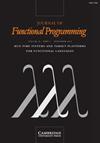跟踪合同
IF 0.6
3区 计算机科学
Q4 COMPUTER SCIENCE, SOFTWARE ENGINEERING
引用次数: 0
摘要
行为软件契约允许程序员加强他们用传统类型表达的义务和承诺。不过,当涉及到在多次函数调用中保持不变时,行为软件合约就缺乏表现力了。跟踪合约缩小了这种表达能力上的差距。跟踪合约是对函数调用和返回值序列的谓词。本文介绍了跟踪合约的原理设计、实现和评估。本文章由计算机程序翻译,如有差异,请以英文原文为准。
Trace contracts
Behavioral software contracts allow programmers to strengthen the obligations and promises that they express with conventional types. They lack expressive power, though, when it comes to invariants that hold across several function calls. Trace contracts narrow this expressiveness gap. A trace contract is a predicate over the sequence of values that flow through function calls and returns. This paper presents a principled design, an implementation, and an evaluation of trace contracts.
求助全文
通过发布文献求助,成功后即可免费获取论文全文。
去求助
来源期刊

Journal of Functional Programming
工程技术-计算机:软件工程
CiteScore
1.70
自引率
0.00%
发文量
9
审稿时长
>12 weeks
期刊介绍:
Journal of Functional Programming is the only journal devoted solely to the design, implementation, and application of functional programming languages, spanning the range from mathematical theory to industrial practice. Topics covered include functional languages and extensions, implementation techniques, reasoning and proof, program transformation and synthesis, type systems, type theory, language-based security, memory management, parallelism and applications. The journal is of interest to computer scientists, software engineers, programming language researchers and mathematicians interested in the logical foundations of programming.
 求助内容:
求助内容: 应助结果提醒方式:
应助结果提醒方式:


